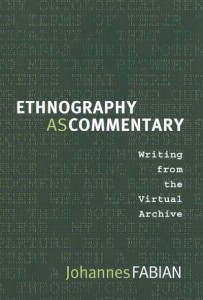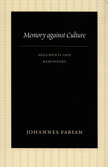This is a long, drafty, and somewhat less review-y version of a review I am writing about Johannes Fabian’s latest projects.
Johannes Fabian, Ethnography as Commentary: Writing from the Virtual Archive, Durham, N.C. Duke University Press, 2008. 140p.
Johannes Fabian, Memory Against Culture: Arguments and Reminders, Durham, N.C. Duke University Press, 2007. 192p.
Johannes Fabian’s contributions to anthropology are distinctive. Depending on where you start, he is an Africanist, a linguistic anthropologist, a partisan and critic of the “Writing Culture” moment in American anthropology, a folklorist and student of popular culture, a historian of drug use by colonial anthropologists, a theorist of time, memory and alterity, and now something of a hacker as well. Two books have been published recently which capture some of his heterogeneously distinctive work. The first, Memory against Culture, collects several recent talks and articles, including one called “Ethnography from the Virtual Archive” which is the germ of the second book Ethnography as Commentary, which is both a meditation on creating a “virtual archive” of ethnographic sources and a “late ethnography” of a popular ritual which Fabian experienced in 1974 in Zaire with a healer named Kahenga.

Ethnography as Commentary is a fabulous (and short!) book. It is an excellent introduction to the detailed practice of ethnographic interpretation; it is also a very thought-provoking meditation on the changing possibilities of the ethnographic monograph after the Internet, and of the possibility of ethnography as commentary. Lastly it is an experiment in “late ethnography” in which an explanation of a cultural event (Kahenga’ ritual exclusion and protection of Fabian’s house in the Katanga district) is conducted through memory, notes and sources, contrasted with the practice of writing history and used to shed light on the authority of ethnographies based in contemporary sources.
The core of the experiment proposed by Fabian is the creation of an online resource of materials: The Language and Popular Culture in Africa Archives (LPCA). The PCA includes an online open access journal started in 2001; a collection of heterogeneous transcripts and documents collected, transcribed, translated and annotated, all of which bear some rough thematic connection to popular culture in Central Africa. It includes, for instance, a Boloki perception of a visit to Europe written in 1895-1897; translated and annotated poems from a French collection of Central African songs and poems published around 1930. Several conversations that Fabian has recorded over the years (including the one which is at the center of Ethnography as Commentary). An interview with a Burundi potter discussing the history and local techniques; the “archives of popular culture” which contain letters, a local history of Zaire, a play “Power is Eaten Whole” by the “Troupe Théâtrale Mufwankolo” of Lubumbashi; a vocabulary and other texts; an extensive bibliography of related sources.
This online corpus is quite obviously more complete and detailed than anything that could previously been published in a standard ethnographic monograph. Surely everyone in Fabian’s generation can relate a story of making hard decisions about what to include and what not to include in an ethnographic monograph constrained by publishers’ page and image limits, concerns about untranslated materials, restrictions on footnotes, appendices and so forth. But this raises a new problem: what are we to do with such a beast, since the answer is certainly not “read it.” Fabian’s Aha! moment came when he realized that placing all this material online and available for experts to consult necessarily has an impact on what the subsequent monograph should look like. The archive is not the thing itself, it is just the material that was once inaccessible: the demand to write something that synthesizes it remains… but what should it look like? Should it continue to take the form we have come to recognize in an ethnography; namely, that synoptic, but selective and partial catalogue of vignettes and descriptions meant to stand in for a much richer corpus of documents and notes?
Fabian’s answer is twofold: on the one hand, no. Something new, e.g. commentary, might now be ascendant as a form of composition in which reference to a changing and growing archive of shared materials is presumed. But on the other hand, no. Memory and participation remain the complicated prolegomena to writing anything, whether or not all the sources are now available. Fabian makes this point clear in the experiment in “late ethnography” where not only documents, but his own memory and authority are on display as a kind of evidence that remains as inaccessible to others as ever. For many readers, this book may fail on both counts, but that lends it the unique distinction of being the only book so far to do so. What is at stake here is a rigorous rethinking of how research and writing in socio-cultural anthropology are conducted today, and not an attempt to invent some new mode or style. The fact that Fabian has tried this experiment should be warrant and proof enough that it is both worth doing, and a challenge worthy of intellectuals; it is not just a question of finding a research assistant who can throw some things up on the web for others to consult. It is an editorial, archival, and theoretical task at once.
Of course, Fabian seems anxious, and justly so, about whether readers of his short text will actually ever look at the archived materials. Though he mentions this fear in both the book and the precedingarticle, he can’t explain why he fears this. I did look at it. On the one hand, as someone with knowledge of popular culture in twentieth century Africa approaching the infinitesimally small, I can say that browsing the archives was no more or less compelling than browsing the stacks in my library looking for the curious, the surprising or the unfamiliar. It’s not my bag, but it’s nonetheless fascinating. However, I can much better imagine myself as that student of African popular culture for whom this archive is not only a fantastic resource that just 10 years ago would have required a trip either to Africa or to Fabian’s university to find, but also as
something to potentially contribute to: something in between a newsletter and a full-fledged journal, but with no limits on size, depth or arcana. I don’t think many people will look at it, but that doesn’t really matter to his argument that it changes the possibilities and meaning of ethnographic writing to have such a technical affordance available.
Of course, such projects will naturally confront all of the issues already familiar: copyright and privacy issues, sustainability (both in terms of personnel to run the archive and formats and software that must be updated or lost permanently) and more general ‘ethical’ concerns about the safety, sovereignty and rights of informants and subjects. Fabian doesn’t directly address these issues in the book, but that actually makes it a better read: it is carefully focused on the theoretical and methodological challenges to ethnography. The other issues can be found elsewhere.
Indeed, one of the most impressive aspects of this short book is the detail and attention with which Fabian investigates every step of the construction of this archive, the interpretations, the claims he can and cannot make about Kahenga’s work, world and thought. The interpretive method laid bare as process. His is a struggle to shore up the “regime of truth” within which this kind of ethnographic writing exists by relentlessly unfolding the process bit by bit. As such, the book might be an excellent tool for teaching in a methods class, what it means to move step by step towards one interpretation that is better than others, and towards the construction of a personal “archive” of materials out of which to make such claims.
What Fabian’s demonstration of interpretation makes especially clear is that the claims to truth he makes are not based on the act of the act of interpretation itself, but much more on the laying of groundwork necessary to get to that point. Expertise is a piecemeal, long-term, painstaking project, and one that is never complete. On this foundation alone is it possible to make claims which critics might see as “merely” interpretations of “unrepresentative” events and “partial” knowledge. It is this foundation which distinguishes a naive from an experienced observer’s interpretation of some event—it is the obsessive filling in of background and context, all of which
are quasi-interpretational, in order to give meaning to one highlighted sequence of events. Obviously this is not the only thing that ethnography can do, nor even the most widely practiced—but it is one of the most powerful; the kind of research that people recognize when they refer to ethnography as rich, detailed, thick, textured, or any of the other baroque terms of approbation that have been so important.
One might ask: what distinguishes this problem from that faced by historians? On the one hand, very little. Historians (and literary scholars and others) are being confronted by a similar challenge to rethink the historical monograph in an era when digital collections are rapidly being created and made openly available. Similarly, the question of “history as commentary” might be a useful counterpoint to Fabian’s experiment. Raising commentary from its low-status as something undistinguished and requiring little thought to something more like “debugging,” re-designing or re-mixing requires rethinking collaboration and coordination of work as well. On the other hand, ethnography of the sort Fabian proposes here does retain something distinctive, which is the manner in which expertise is constructed, pedagogically speaking, both in the training of scholars and in the necessary experience of “being there” which is presumed to be a kind of epistemological encounter necessary to the creation of ethnographic knowledge.

I’ve said almost nothing about Fabian’s companion volume, Memory against Culture published contemporaneously with Ethnography as Commentary. It is a collection of previously published articles, and Fabian will hopefully forgive me for dwelling less on the content of
these essays (which ranges across that distinctive heterogeneity I mentioned at the outset), and more on the form of the publication. The act of publishing a collection of pre-published articles has its own kind of meaning–and even more so today after the transformation of publishing by the Internet. Just as Fabian’s archive of arcane Swahili materials was unavailable before the internet, most if not all of these essays are now hyper-available for the same reason (at least those in journals, if not those in edited volumes).
On the one hand, this is a strange kind of confirmation that even though available, there is nonetheless value in collecting these essays together as an event and archive of its own kind. In some ways, the problems of memory and forgetting, and of “late” ethnography are not only features of ethnographic investigation, but of social and human sciences generally… the work of scholars can be forgotten in so many ways: published in obscure journals and expensive collected editions, gone out of print, becoming unfindable online, being disappeared from libraries due to rising costs of journal subscriptions, being remaindered, not being taught, to say nothing of simply not being read, a fate most of us are already well resigned to. So Memory against Culture is in many ways an act of memory, rather than one of publishing, and it is worthwhile to reflect on this in a Fabian-esque manner: to take seriously, theoretically and methodologically, every layer of this onion of knowledge production we engage in as contributing to the shaping of that very knowledge we desire to produce. We need constant reminders of this today, in the face of an onslaught of new forms of media, new archives, new and ever-fancier tools that both enable and constrain our desire to know ourselves and our worlds. And we need arguments for why and how to use these new things, and for how they make us forget in new ways.
0 thoughts on “Memory, Virtual Archives and Johannes Fabian”